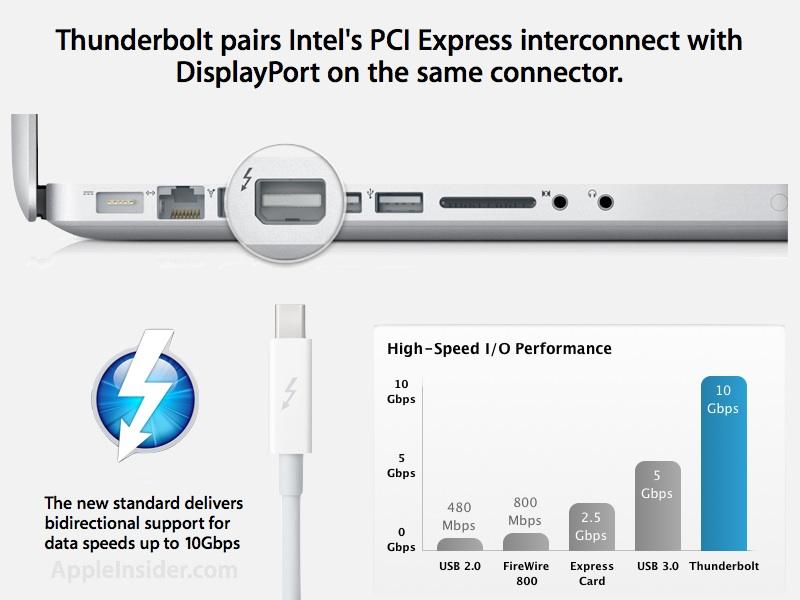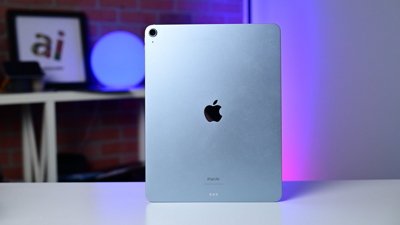Intel announced this week that it will ship silicon that will support both USB 3.0 and Thunderbolt in 2012. According to CNet, Kirk Skaugen, vice president at Intel's Architecture Group, said he believes the two technologies are "complementary."
Support for both Thunderbolt and USB 3.0 will appear in Intel's next-generation chips, code-named "Ivy Bridge." Ivy Bridge is the successor to the "Sandy Bridge" processors that began shipping earlier this year.
Both Sandy Bridge and Thunderbolt debuted on Apple hardware with the new lineup of MacBook Pros that went on sale in February. The new Thunderbolt port, co-developed by Intel and Apple, features two bi-directional channels with transfer speeds up to 10Gbps each.
Formerly code-named "Light Peak," Thunderbolt's data transfer speeds are 20 times faster than the current, widely available USB 2.0 specification. Thunderbolt is also twice as fast as the not-yet-widesread USB 3.0 spec.
Despite the slower performance of USB 3.0, Intel has reportedly encouraged developers to support both the Thunderbolt and USB 3.0 standards with any external peripherals. Intel's 2012 Ivy Bridge chipsets will include support for USB .30 directly on the chip, which means USB support will be available on all machines, including laptops.
 Sam Oliver
Sam Oliver








 Amber Neely
Amber Neely
 William Gallagher
William Gallagher
 Christine McKee
Christine McKee
 Andrew Orr
Andrew Orr

 Sponsored Content
Sponsored Content










65 Comments
While it certainly makes sense for Intel to support both, I just can't see that USB 3.0 has any value. Since there are no existing USB 3.0 devices, anyone creating a new product has to decide between USB 3 and Thunderbolt. Why not pick the faster, daisy-chainable technology?
USB 3 has the advantage of operating older (USB 2.0) devices, but so would a USB 2.0 port.
From a computer manufacturer's perspective, until this announcement, they could have had USB 2.0 and Thunderbolt on their system. Now they can have USB 3.0 and Thunderbolt on their system. Sure, they'll do it because it's the same number of ports, so why not use the faster one, but there's really no advantage unless there are a lot of USB 3 devices out there.
From a device manufacturer's perspective, Thunderbolt is superior. So if you're making a new device, USB 3.0 doesn't make much sense - so I don't expect to see a lot of USB 3 devices. The ONLY thing that could save USB 3 from a device manufacturer's perspective is if a USB 3 device would work when connected to an older computer with a USB 2.0 port, but I don't think that will work.
Intel dragged its feet so long that the way things are going, AMD will be first to support it in chipsets. Their main rival. Adopting their own tech before they do. Oi, Intel.
The ONLY thing that could save USB 3 from a device manufacturer's perspective is if a USB 3 device would work when connected to an older computer with a USB 2.0 port, but I don't think that will work.
Ah, but it does work. There are a few USB 3.0 hard drives out there (maybe more than a few; certainly more than none) and they advertise their backwards compatibility for use on USB 2.0 machines. Since USB 1, 2 and 3 all use the same port (unlike Firewire 400 and 800), there is no reason for manufacturers (of computers and peripherals) to switch to 3.0 except for cost. I expect the cost difference (if there is one) to disappear quickly as everyone switches over. USB 2.0 will be history shortly.
I think it depends on which side of the peripheral divide we are looking at. From a systems manufacturers point of view, there doesn't seem to be a compelling reason to choose USB3 over Thunderbolt, since TB will effectively give them USB3 through adapters. They could certainly have both, but if they had to choose one, my bet would be on TB, assuming the cost is not substantially higher.
But for the device manufacturers, it is a different story. Adding multiple ports on a single device is less common than single port devices. In that case, when choosing between TB and USB3, if they had to choose, I would guess they would opt for USB3. They could do two identical devices, one with TB and one with USB3, but that adds to costs, inventory management, etc. The choice for a single standard would seem to be the opposite reasoning than the systems manufacturers. If the device people had to choose one over the other, then USB3 would seem to make more sense. It will work with TB systems through adapters, whereas a device with a native TB port might not work with a USB3 system port (or would it?).
While it certainly makes sense for Intel to support both, I just can't see that USB 3.0 has any value. Since there are no existing USB 3.0 devices, [...]
What? There are TONS of USB 3.0 devices on the market. Especially external hard disks.